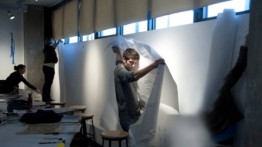Curriculum

The goal of the BFA program is to educate students in the skills, knowledge, and understanding necessary for professional practice in art- and design-related fields. Our integrated curriculum educates students in specific fine arts disciplines but also in the complex interrelation of all visual vocabularies. Through courses in the humanities, the social sciences, the sciences, and the history and theory of art, the program invites students to expand their studio education across disciplines and subjects.
The first year Foundation Program is designed as a basis for the educational program of the School of Art and is intended to prepare students for studies in all the disciplines offered within the curriculum. Through exposure to a variety of two-, three-, and four-dimensional projects, students are given a general introduction to the specifics of visual and spatial phenomena, and to concepts, principles, and techniques of the visual arts. Required courses in the history and theory of art, and in Cooper Union’s unique humanities and social sciences “core” sequence, introduce critical thinking and writing as a necessary part of artistic practice.
Following the completion of the Foundation Program, sophomore students may choose courses in the disciplines of drawing, audiovisual, graphic design, painting, photography, printmaking, and sculpture. Elective studio and techniques classes are also offered on a rotating basis. Since the prerequisite studio courses students take in sophomore year will in large part determine their options for advanced study, students are encouraged to choose a variety of areas in consultation with their instructors and advisors. A continuing involvement in general academic studies serves as a tool to broaden each student’s developing studio experience across histories of ethics, social agency, and human expression.
In junior year, students experience increased freedom and flexibility to determine the depth and breadth of their advanced studies. Students are encouraged to use general academic studies electives, along with elective courses offered by the Schools of Architecture and Engineering, as a basis for the self-directed inquiry which is an integral part of making art.
Seniors work with the highest degree of autonomy, taking advanced courses based on their sophomore and junior prerequisites, expanding both technical aptitude and critical dexterity, and developing a continuous studio practice. The Senior Presentation is an opportunity for a public showing and telling of this work, and, together with projects across the curriculum, provides a context through which students prepare for work and life after Cooper.
Since each transfer student arrives at the School of Art with unique experiences and background, they work closely with their advisors to determine the appropriate academic trajectory.




